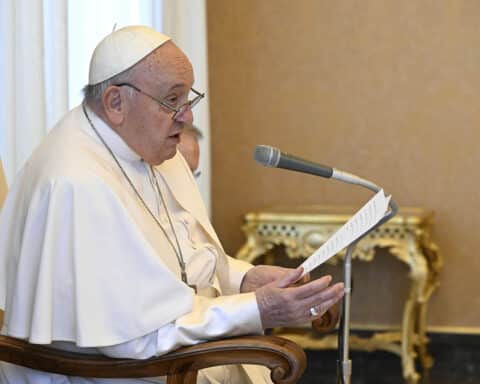
Jesus Christ does not let us hang onto to this idol of a sugar daddy: a God who gives us material gifts when we follow the Gospel.
One of Jesus’ followers has a problem. His brother won’t share his inheritance with him. So, he screams out, “Tell my brother to give me some of that money!”
Now, let’s be clear. Before we turn this man into an enemy of the Gospel, he does have a righteous concern. A just elder brother would share the inheritance, caring for the entire family. Receiving no money, perhaps this man is close to destitution. This man’s stingy brother is engaging in an unrighteous deed. He is disobeying the Law, not caring for the stranger, the orphan, even his own family.
| 18th Sunday of Ordinary Time – August 4, 2019 |
|---|
|
ECC 1:2; 2:21-23 |
But the brother does not cry out asking that Jesus return his brother to righteousness, restoring the relationship of love. He just wants the money! To hell — literally — with his brother.
Jesus responds harshly. He is not some random judge or an arbiter of human affairs. Our Lord has come into the world to bring about the reign of God, to overthrow the logic of power and prestige. He has come to restore human beings to right relationship with God and one another.
As Jesus often does in the Gospel of Luke, he does not respond to the man’s inquiry with hopelessness. Rather, he teaches. He preaches. Jesus believes that it’s possible to teach this man that Jesus’ Father is not a sugar daddy.
There is a man who tore down his barn to build a bigger one. He had too much grain. So, it was time to store more. To our eyes, this man is successful. He’s made it. Building a larger barn is the only prudent thing to do. God even could be rewarding him for his righteousness.
But notice what he didn’t do. He didn’t sell the grain, giving the proceeds to the poor. He didn’t give the extra to the hungry. He thought only of himself and to increase his own profit. He rejoiced in his own income.
“No!” proclaims Jesus. Not only is God not a sugar daddy, but God desires a return gift. We are obliged to give everything to God and everything we have earned back to God. Nothing is really ours. As we approach death, we learn to recognize all that we have gained in this life will one day disappear.
Nothing is forever. So we should give it away. Material goods — no matter how amazing — will not last. God did not enter the world to announce a reign of prosperity, the Good News that faith will be rewarded with cash and happiness.
The Word became flesh to enact for us what this gift of self means. It is total, absolute. We are to abandon ourselves to the logic of this divine love, unconcerned about the question of reward.
God is not a sugar daddy. God did not enter the world to make our lives better or to allow our stocks and bonds to mature. God entered the world because God is love: Love unto the end. God is the Father of infinite, total, absolute, eternal love.
Timothy P. O’Malley, Ph.D., is the director of education at the McGrath Institute for Church Life at the University of Notre Dame.





